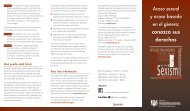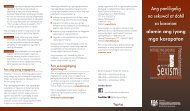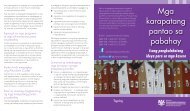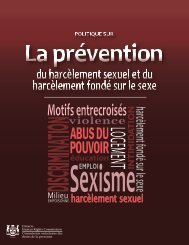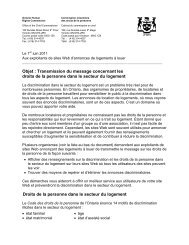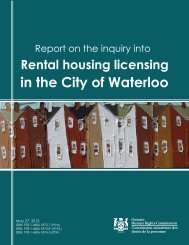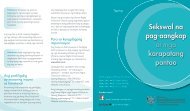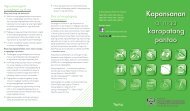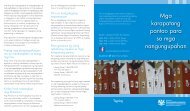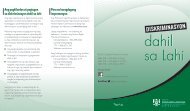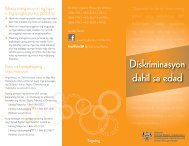Action!
Rights, Partners, Action! - Ontario Human Rights Commission
Rights, Partners, Action! - Ontario Human Rights Commission
- No tags were found...
Create successful ePaper yourself
Turn your PDF publications into a flip-book with our unique Google optimized e-Paper software.
Aboriginal issues: from human<br />
rights to Truth and Reconciliation<br />
Aboriginal human rights issues must be addressed in<br />
Ontario. The OHRC is seeking input from members<br />
of the Aboriginal community on human rights issues<br />
of concern. For example, our Aboriginal Steering<br />
Committee is building relationships and knowledge<br />
to expand our work<br />
We are proud of our partnership with the Truth<br />
and Reconciliation Commission of Canada (TRC).<br />
The TRC was established as a result of the 2007<br />
Indian Residential Schools Settlement Agreement.<br />
Its mandate is to inform all Canadians about what<br />
happened in the 150-year history of the residential<br />
schools, and to guide and inspire a process of<br />
reconciliation based on mutual understanding<br />
and respect. In 2012, Barbara Hall was named an<br />
Honorary Witness to the TRC, and we worked<br />
together on some key events.<br />
In June 2012, Barbara Hall and Commissioners<br />
Maggie Wente and Larry McDermott hosted<br />
a session at “The Meeting Place,” a two-day<br />
intergenerational regional gathering. This event, hosted<br />
by a cooperative of Aboriginal and supporting<br />
organizations, was designed to “promote respect,<br />
education and engagement on the<br />
Indian Residential School System.”<br />
In a session on “Human rights in<br />
Ontario: From Rights to Reconciliation,” we provided<br />
information about the Human Rights Code, Ontario’s<br />
human rights system, and how the OHRC can play<br />
a role in reconciliation. We also asked people to<br />
continue the conversation with us, by letting us know<br />
other ways that we could support reconciliation<br />
and respect for the Aboriginal Peoples in Ontario.<br />
In August 2012, the OHRC partnered with the<br />
TRC to present “Shared Perspectives, An Evening<br />
of Reconciliation” as part of the Planet IndigenUS<br />
Festival at Harbourfront Centre in Toronto. This<br />
evening featured TRC Chair Justice Murray Sinclair,<br />
performances by dancers and drummers from the<br />
Aboriginal and Black communities, and an authors’<br />
dialogue between writer-storytellers Itah Sadu<br />
and Richard Wagamese, moderated by broadcast<br />
journalist Shelagh Rogers.<br />
This event widened the reconciliation conversation<br />
between Aboriginal communities and other racialized<br />
Canadian communities.<br />
Photo by Priscilla Goulais<br />
Barbara Hall took part in discussions on human<br />
rights issues affecting First Nations people at<br />
the Union of Ontario Indians head office on<br />
Nipissing First Nation near North Bay. From<br />
left to right: Melvin McLeod, Human Resources<br />
Manager, Nipissing First Nation: Barbara Hall:<br />
Maurice Switzer, Director of Communications,<br />
Union of Ontario Indians: Nancy Potvin, Program<br />
Manager, North Bay Indian Friendship Centre; and Fred Bellefeuille, Legal Department Director,<br />
Union of Ontario Indians.<br />
The group is seen with the Covenant Chain Wampum Belt exchanged with the British at the Treaty<br />
of Niagara Congress in July, 1764. In accepting the Wampum, many presents and promises<br />
by the Crown in Canada, Indigenous peoples around the Great Lakes accepted the terms of the<br />
1763 Royal Proclamation, which recognized them as Nations – peoples with inherent rights.<br />
These rights are specifically mentioned in Section 35 of the Constitution of Canada.<br />
Ontario Human Rights Commission • 2012-2013 Annual Report 25



